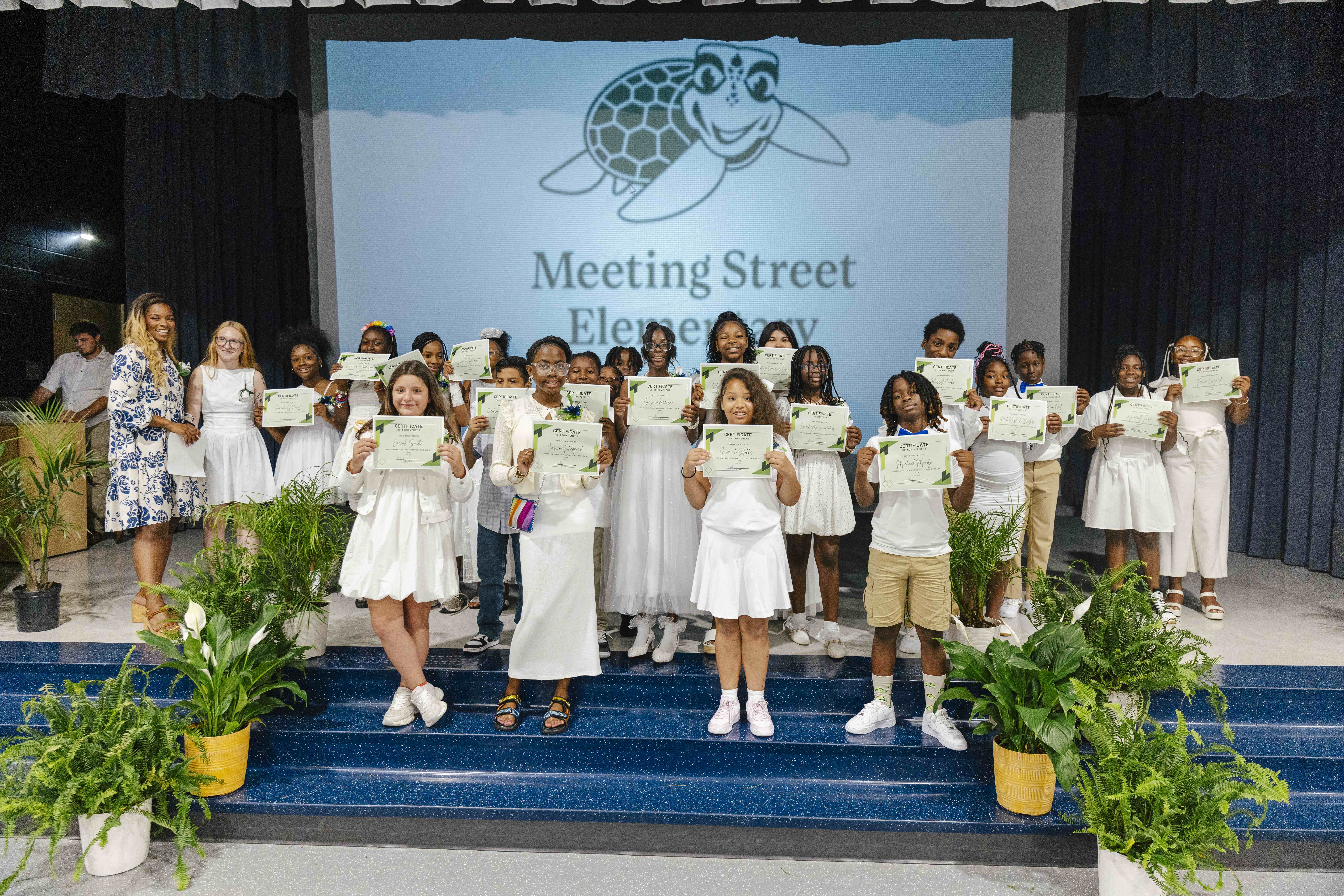Teachers preach the gospel of grit to their students at Meeting Street Elementary @Brentwood, a unique public school under private management in an impoverished section of North Charleston.
What’s grit?
“That means you’re never giving up,” said 7-year-old Kayla Jackson, who recently transferred to the school. “You just work hard.”
Administrators are quick to give students praise for strong academic performance, but part of their success may also be ascribed to an infusion of private money and a blue-sky approach to innovation — facets of Brentwood that could represent a new model of public education for low-income and minority students.
Next week, the Charleston County School Board will consider replicating the early success at Brentwood with another private-public partnership at nearby Burns Elementary, a perennially struggling school that serves a similar population.
“Burns has been a poster child for the achievement gap, and we want to take them off that poster as soon as possible,” said Ben Navarro, founder and CEO of Meeting Street Schools.
The Brentwood experiment
Opened as a neighborhood school in fall 2014 on the former Brentwood Middle campus, Meeting Street Elementary @Brentwood exists in a league of its own, offering two teachers per classroom, an extended school day and school year, and an in-house crew of therapists and social workers.
Meeting Street Schools, which also operates private schools in Charleston and Spartanburg, gets leeway from the district to spend public money, make curriculum decisions and hire and fire teachers at Brentwood.
The Brentwood leadership has made some bold hiring decisions, including an on-staff speech therapist and Pamela Pepper, the school’s director of student and family support. A doctor of clinical psychology, Pepper — yes, Dr. Pepper — works with students on behavior problems, helps families navigate Medicaid paperwork and helps enroll hungry children in the Lowcountry Food Bank’s BackPack Buddies program.
Principal Sarah Campbell instructs the students to ignore visitors, many of whom come to observe the rarefied environment, and focus on their work. Even the kindergartners carry on almost undeterred when a cadre of grown-ups walks into their midst.
There are plenty of opportunities for distraction at Brentwood: Educators, media and state political leaders including Gov. Nikki Haley have visited the school since its opening to see what they’re doing differently. Navarro insists there is no “magic educational dust,” but Brentwood’s initial test results show that the school is working wonders.
Last school year, the school gave its kindergartners the MAP (Measures of Academic Progress) test in the fall, and only 34 percent scored above the national median for their grade level. When they took the test again in the spring, 85 percent beat the median — including 60 percent who made it into the top quartile.
Just a year after a shaky start, the students had blown the test out of the water.
“If they can stay in that quartile, that means USC, that means Clemson, that means a Life scholarship, that means they’re absolutely employable,” Navarro said. “That means, to some extent with these kids, the world is their oyster.”
The Burns plan
At Burns Elementary, district Superintendent Gerrita Postlewait said she hopes to expand on “a partnership that has proven to be tremendously successful.” Following the pattern set at Brentwood, the school would be governed by an executive board consisting of herself, Navarro and Brentwood Principal Sarah Campbell.
“The superintendent is acting as the school board’s employee, with the responsibility to report immediately to the board any concerns that exist regarding student performance, personnel matters, building condition, or other situation,” district spokeswoman Erica Taylor wrote in an email.
As with Brentwood, Meeting Street Schools would start small at Burns, starting with a class of kindergartners and adding a grade level each year. The remaining grade levels from Burns would meet in a “swing space” at the McNair campus on Spruill Avenue while the district builds a new campus for Burns.
Postlewait said her plan for the upper grades at Burns is to “create for them the best we can an environment that’s very much like the one that’s created a Brentwood.”
In her proposal to the school board, Postlewait will ask the board to kick in an additional $3,000 per student for the fledgling kindergarten program, beyond the roughly $10,000 it would spend ordinarily. Meeting Street Schools would be on the hook for any expenses beyond that.
Navarro said that while startup costs can be high at his schools, education leaders won’t be able to argue with the strong results.
“People are looking for solutions, and if we can be that solution, then all of a sudden it becomes pretty powerful,” Navarro said.
Big money
When Meeting Street Schools first took control at Brentwood, it was reported that private donors furnished $1.3 million to help renovate the aging campus. But that wasn’t all of the private investment in the public school.
The district gives Meeting Street Schools about $10,000 per pupil to spend as it chooses. That’s not enough to meet the school’s intensive staffing demands, particularly with a school day that lasts until 5:30 p.m. for most students.
Meeting Street Schools Chief of Staff Chris Allen declined to say how much the organization spends per pupil at the school. It currently only serves pre-K through first grade, but once it expands to fifth grade, he said the school will have reached an “economy of scale” that only requires an additional $3,000 per student.
Meeting Street Schools had nearly $30 million in assets in 2014 and spent nearly $2 million that year, including $35,000 on lobbying, according to IRS paperwork. It has received sizable donations from Navarro’s own financial services company, Sherman Financial Group.
Despite the unspecified startup costs, Campbell said the Brentwood model can be replicated elsewhere.
“All the things we’re doing can be replicated in schools within the district,” Campbell said. “Whether it’s a Meeting Street Elementary @Burns type of school or it’s another type of pilot that Dr. Postlewait comes up with, the idea is that you have to do something different for kids who need more.”
Hiring and firing
Among the myriad things that make Meeting Street Elementary @Brentwood unusual, Campbell’s teachers are employees of Meeting Street Schools, not the district, allowing Campbell to hire and fire as needed.
Early in its planning process, the company sought and received an exemption from South Carolina’s Teacher Employment & Dismissal Act, which requires a hearing before firing a teacher.
“We weren’t going to do the project without it,” Navarro said. “To us, [Campbell] has to have the autonomy to select her staff, because this is hard work.”
But some local teachers are concerned about abridging the state’s protections for teachers, which are meant to prevent discriminatory practices including the firing of older, better-paid teachers.
“To me it blurs the lines as to whether those teachers are ultimately accountable to the people of Charleston County or to their principal,” said Jody Stallings, an eighth-grade English teacher at Moultrie Middle School and director of the Charleston Teacher Alliance. “We would definitely fight this policy if they were regular public school teachers, but since those teachers aren’t really CCSD employees, they aren’t a part of the CTA.”
The Brentwood plan had other skeptics from the start, including NAACP Charleston Branch President Dot Scott, who said she is generally wary of private takeovers of public schools. But after touring the school, seeing the numbers and hearing rave reviews from a family member with a grandchild enrolled, she changed her mind.
“I was so wrong. I’ve never been so wrong,” Scott said. “The only downside is we wish we had more schools like it.”
The Charleston County School Board will consider the proposal for Burns Elementary during its Feb. 8 committee meetings and vote on the proposal at its Feb. 22 full-board meeting.



